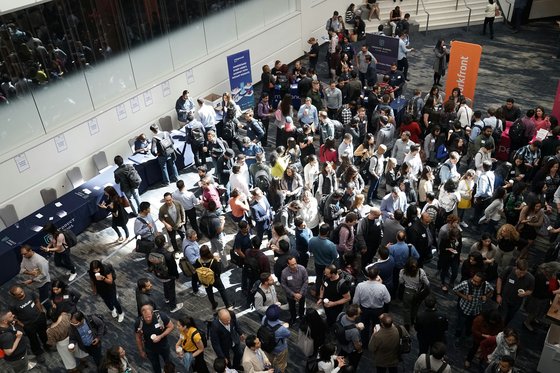Last week, I attended my second ALPSP conference and it was great seeing so many familiar faces again, whilst also meeting a lot of new people. When approaching the venue, the first noticeable thing I saw from the taxi was a giant football shoe on a truck. Not sure what it was for, but at least it was hard to miss!
The rest of that day was mostly meeting existing partners and customers to discuss new directions, which unfortunately meant that I missed the first sessions. Luckily people told me all about the game presented in the opening session during the welcome reception! Then I was able to attend an activity that apparently happens quite a bit within scholarly publishing, but I never experienced firsthand: Karaoke in Manchester. A great way to end the day.
Day 2 started with a session closest to our core at Global Campus: Innovations in Peer Review. Three panel members shared their thoughts. It was great to see that the approach Enric Sayas shared about finding reviewers was closely in line with our approach. And much more importantly, he had the same experiences of what this approach can lead to:
- Reduce the number of invitations sent per manuscript
- 50% reduction in the number of ‘out of scope’ replies
- Reducing the time required to secure enough reviewers
A confirmation that our approach is the correct way of reducing the burden of finding peer reviewers.
Christopher Leonard shared a much more philosophical thought, which is, should we continue doing peer review in this shape and form? It seems practically impossible with the rise in manuscripts each year. Some thoughts included working with a professional pool of reviewers (would they still be peers when not active in academia?) and let generative AI do most of the heavy lifting. Although we ourselves have been quite critical on some occasions about the quality of review with genAI, there is definitely a large group of reviews out there which are not necessarily better than an automated review. I'm looking forward to what the future will bring, but in the words of Christopher, it is very likely there will be three types of reviews in the future: AI reviews, human reviews and hybrid reviews.
Last but not least, insights of Laura Feetham-Walker who reminded us that not all innovations are technological (although technology was needed to execute). By formally linking young researchers to experienced researchers in the review process, both could be credited. Solving the common issue of PI’s taking credit for the review of their junior researchers. She presented some great successes since IOP introduced this, including a lot of new names to the reviewer pool of IOPP and higher quality reviews!
The evening followed with dinner, awards and a quiz! And after being part of the quiz winning team last year, this year I was part of the losing team. But again, I didn’t go home empty handed. Instead of an Amazon coupon, I brought back a wooden spoon! Not bad at all. See you in Frankfurt!

